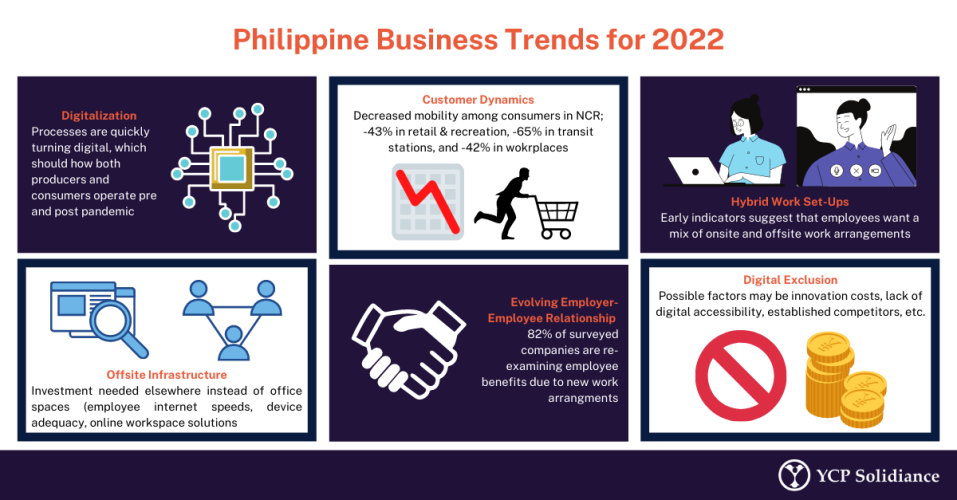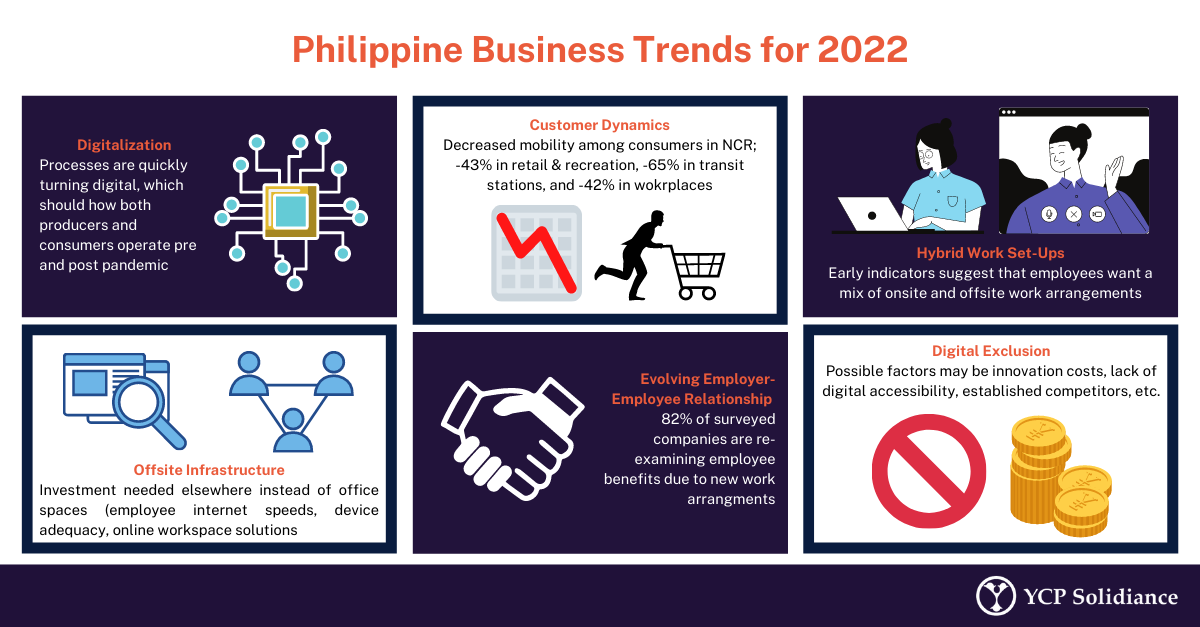
What's The Latest Tech Trends In Filipino Businesses?
Are you curious about the latest tech trends in Filipino businesses? Well, you've come to the right place! Technology plays a significant role in the growth and development of businesses in the Philippines, and staying updated with the latest trends is vital for success. So, let's dive in and discover what's buzzing in the world of technology for Filipino businesses.
In today's fast-paced world, technology is constantly evolving, and businesses in the Philippines are keen to embrace the latest advancements. From the rise of e-commerce and digital marketing to the adoption of artificial intelligence and cloud computing, Filipino businesses are harnessing technology to streamline their operations and reach a wider audience.
One of the emerging tech trends in Filipino businesses is the use of mobile apps for various purposes. Whether it's ordering food, booking a ride, or managing finances, mobile apps have become an integral part of Filipino consumers' lives. Businesses are taking advantage of this trend by developing their apps to enhance the customer experience and increase engagement.
So, get ready to explore the fascinating world of tech trends in Filipino businesses. From mobile apps to e-commerce and more, we'll delve into the exciting ways technology is shaping the future of business in the Philippines. Let's get started!

The Latest Tech Trends in Filipino Businesses: Unlocking Innovation for Growth and Success
Technology plays a crucial role in the growth and success of businesses around the world, and the Philippines is no exception. In recent years, the country has witnessed a surge in the adoption of advanced technologies, transforming the business landscape and opening new opportunities for innovation. From embracing the power of artificial intelligence to leveraging cloud computing solutions, Filipino businesses are staying ahead of the curve and reaping the rewards of technological advancements. In this article, we will explore the latest tech trends in Filipino businesses and delve into how they are shaping the future of the economy.
1. Harnessing the Power of Artificial Intelligence
Artificial Intelligence (AI) has taken the world by storm, and Filipino businesses are joining the race to leverage its power. From chatbots providing 24/7 customer support to advanced data analytics systems, AI is being integrated into various business processes to enhance efficiency and productivity. Many companies are using AI to automate repetitive tasks, analyze data for insights, and personalize customer experiences. With the increasing availability of AI tools, Filipino businesses are embracing this technology to stay competitive and gain a deeper understanding of their customers' needs.
One sector witnessing significant AI adoption is e-commerce. Filipino online retailers are leveraging AI algorithms to analyze consumer behavior, predict buying patterns, and offer personalized product recommendations. By understanding their customers better, businesses can tailor their marketing and sales strategies, increasing customer satisfaction and loyalty.
2. Embracing Cloud Computing Solutions
Cloud computing is revolutionizing how businesses operate, and Filipino enterprises are jumping on the bandwagon. By migrating their data and applications to the cloud, businesses can enjoy numerous benefits such as cost savings, increased flexibility, and improved collaboration. Cloud-based solutions offer scalability, allowing businesses to easily adjust their resources based on demand.
Filipino businesses are leveraging cloud computing not only for data storage but also for software applications, allowing employees to work remotely and enabling seamless collaboration across multiple locations. Furthermore, cloud-based cybersecurity solutions are gaining popularity, offering businesses enhanced protection against cyber threats.
3. Riding the Wave of Digital Transformation
Digital transformation has become a buzzword in the business world, and Filipino companies are fully embracing this trend. Digital transformation refers to the integration of digital technologies into all aspects of a business, fundamentally changing how it operates and delivers value to customers. For Filipino businesses, digital transformation entails automating processes, integrating systems, and developing digital-first strategies.
One industry undergoing rapid digital transformation in the Philippines is banking and finance. Traditional banks are digitizing their services and introducing mobile banking apps, allowing customers to perform transactions and access financial services at their fingertips. This shift is not only convenient for customers but also facilitates financial inclusion, reaching previously underserved communities.
Examples of digital transformation also extend to the retail sector, where businesses are leveraging e-commerce platforms to expand their customer base and tap into the growing online market. By embracing digital technologies, Filipino businesses are staying competitive, reaching wider audiences, and increasing their revenue streams.
4. Revolutionizing Supply Chain Management with IoT
The Internet of Things (IoT) is transforming supply chain management practices in Filipino businesses. By connecting devices and sensors, businesses can monitor and manage their supply chains in real-time, improving efficiency, reducing costs, and minimizing errors. IoT devices can track inventory levels, monitor product quality during transportation, and automate reordering processes.
In the agriculture industry, Filipino farmers are using IoT devices to monitor soil conditions, temperature, and humidity, enabling them to optimize crop yields and reduce waste. IoT solutions are also being used in logistics companies to track the location and condition of goods in transit, ensuring timely deliveries and minimizing inventory loss.
5. Enhancing Customer Engagement through Omni-Channel Experiences
With the rise of digital technologies, customers have come to expect seamless and personalized experiences across all touchpoints. Filipino businesses are recognizing the importance of delivering omni-channel experiences that integrate online and offline interactions. This approach allows businesses to engage with customers at various stages of their buying journey, enhancing brand loyalty and driving sales.
Retailers in the Philippines are investing in technologies that enable customers to make online purchases and pick up their orders at physical stores. Digital payment options, loyalty programs, and personalized messaging are also being used to create a cohesive customer experience. By providing convenience, personalization, and consistency, Filipino businesses are forging stronger connections with their customers and gaining a competitive edge.
6. Strengthening Cybersecurity Measures
With increased reliance on technology comes the need for robust cybersecurity measures. Filipino businesses recognize the importance of protecting sensitive information and are investing in cybersecurity solutions to safeguard their operations. This includes implementing firewalls, encryption protocols, and intrusion detection systems.
Cybersecurity is particularly critical for businesses that handle sensitive customer data, such as banks, healthcare providers, and e-commerce platforms. By prioritizing cybersecurity, Filipino businesses can build trust with their customers, protect their reputation, and avoid costly data breaches.
7. Leveraging Big Data Analytics for Better Decision-Making
The abundance of data generated by businesses provides valuable insights that can drive strategic decision-making. Filipino companies are embracing big data analytics to gather and analyze vast amounts of information, uncovering patterns, trends, and correlations that can inform business strategies.
In the retail industry, data analytics can help businesses identify customer preferences, optimize pricing strategies, and predict demand. In healthcare, big data analytics can improve patient outcomes by identifying trends and patterns in medical records. By leveraging big data analytics, Filipino businesses can make data-driven decisions, optimize their operations, and gain a competitive advantage in the market.
Key Takeaways: What's the latest tech trends in Filipino businesses?
- 1. Digital transformation is a top priority for Filipino businesses, with advancements in technology being adopted to improve operations and customer experiences.
- 2. Cloud computing and storage solutions are widely embraced, allowing businesses to enhance scalability, accessibility, and data security.
- 3. Artificial Intelligence (AI) and Machine Learning (ML) are increasingly used to automate processes, analyze data, and provide personalized customer experiences.
- 4. E-commerce and online marketplaces are booming, with businesses leveraging digital platforms to reach wider audiences and increase sales.
- 5. Cybersecurity measures are becoming more robust as businesses recognize the importance of protecting sensitive data from cyber threats.
Frequently Asked Questions
As technology continues to advance, Filipino businesses are embracing the latest tech trends to stay competitive. Here are some commonly asked questions about the latest tech trends in Filipino businesses:
1. How are Filipino businesses utilizing artificial intelligence (AI)?
AI is making a significant impact on Filipino businesses. Companies are implementing AI-powered chatbots to enhance customer service and automate repetitive tasks, allowing employees to focus on higher-value work. Additionally, AI is being used for data analysis and predictive modeling, enabling businesses to make informed decisions and improve operational efficiency.
However, it's important to note that AI implementation should be carefully planned and executed to ensure proper data privacy and security measures are in place. Filipino businesses are selectively adopting AI technologies that align with their specific needs and goals.
2. What role does cloud computing play in Filipino businesses?
Cloud computing is revolutionizing the way Filipino businesses store, access, and manage their data. By leveraging cloud technology, companies can store their data remotely, allowing for easy scalability, improved collaboration, and reduced hardware costs. Cloud-based software applications are also becoming increasingly popular, enabling businesses to access their tools and files from anywhere, at any time.
Furthermore, cloud computing enhances data security by implementing robust encryption and backup solutions. Filipino businesses are recognizing the benefits of cloud computing and are migrating their infrastructures to the cloud to drive efficiency and agility in their operations.
3. How are Filipino businesses leveraging e-commerce platforms?
E-commerce has experienced significant growth in the Philippines, and Filipino businesses are capitalizing on this trend. Through the use of e-commerce platforms, businesses can establish online storefronts, reach a wider customer base, and offer convenient purchasing options. Many businesses are integrating payment gateways and logistics solutions into their e-commerce platforms to streamline the buying process.
Filipino businesses are also exploring personalized e-commerce experiences, leveraging customer data to provide tailored recommendations and offers. By embracing e-commerce, businesses in the Philippines are expanding their reach, increasing sales, and catering to the evolving preferences of their customers.
4. What impact does cybersecurity have on Filipino businesses?
Cybersecurity is a growing concern for Filipino businesses in the digital age. With the rise in cyber threats, companies are prioritizing robust cybersecurity measures to protect their sensitive data and safeguard their operations. Filipino businesses are investing in advanced firewalls, encrypted communication channels, and employee training programs to mitigate the risks of cyberattacks.
Moreover, data privacy regulations, such as the Philippine Data Privacy Act, are being strictly followed by businesses. Compliance with these regulations ensures that customer data is handled responsibly and securely. Filipino businesses are recognizing that a strong cybersecurity posture is crucial for maintaining trust with their customers and safeguarding their valuable assets.
5. How are Filipino businesses implementing automation technologies?
Automation technologies are reshaping operations in Filipino businesses. Robotic Process Automation (RPA) is being employed to automate repetitive tasks, reducing human error and increasing productivity. By automating manual processes, businesses can improve operational efficiency and allocate their workforce to more strategic activities.
In manufacturing industries specifically, businesses are integrating robotics and Internet of Things (IoT) devices into their production lines to optimize workflows and achieve higher levels of precision. Filipino businesses are embracing automation technologies to drive innovation and gain a competitive edge in the market.
Summary
Filipino businesses are embracing new technology trends to stay competitive in the market. They are adopting cloud computing, mobile apps, and e-commerce platforms to streamline their operations and reach a wider audience. These technologies help businesses improve efficiency, enhance customer experience, and increase sales. However, it is important for businesses to prioritize cybersecurity to protect sensitive data and ensure the safety of their customers. Keeping up with the latest tech trends is crucial for businesses to thrive in today's digital age.
Recent Posts
- How Does GPON Improve Network Efficiency?
- What Are The Advantages Of GPON?
- What Are The Benefits Of IT Outsourcing?
- What's The Deal With Ransomware Attacks?
- Are GPON Providers Widely Available?
- What's GPON's Impact On Bandwidth?
- Why Is Multi-Factor Authentication Important?
- How To Ensure Data Privacy Compliance?
 Blogs
Blogs Infographics
Infographics Videos
Videos Podcasts
Podcasts Case Studies
Case Studies Call For Quote
Call For Quote